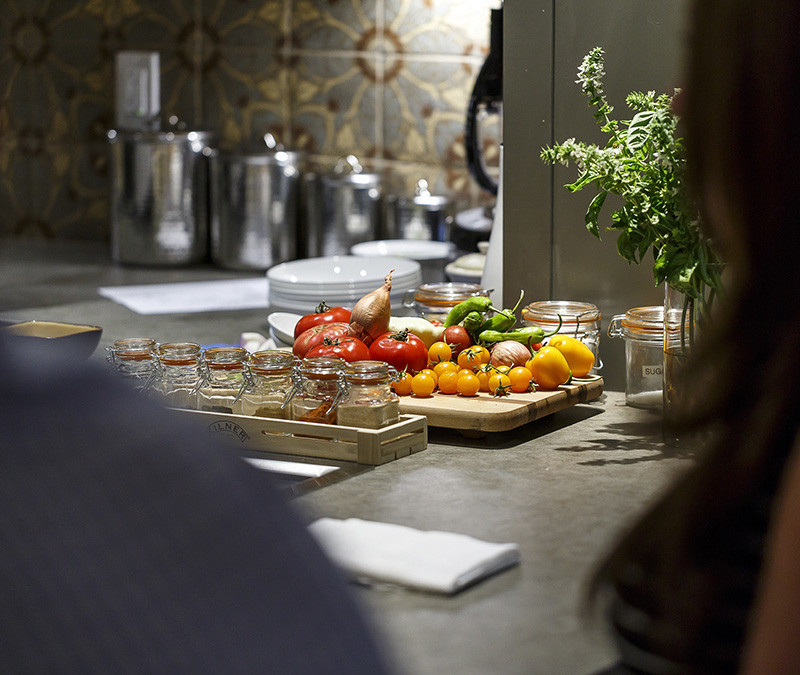It’s important as an educator to be well versed in what you teach. When teaching about culinary arts, that can be a daunting task, but also a welcome challenge.
The berth and depth of all things culinary could fill the library at Alexandria ten times over. Food crosses borders, countries, continents, language, time and space – and that’s just the food itself, never mind how it’s prepared!
From the time of the earliest humans, we have been cooking. We harnessed the power of fire, and thereby began to evolve. We suddenly had the ability to stay warm, extending our life span, and change our diet. The ability to cook set us apart from other animals. We were suddenly able to eat new things. This led to cultivation of the land, to raising animals, and putting down roots. We were no longer beholden to a nomadic lifestyle. In other words, the ability to cook played a tremendous role in creating the way we live today – that’s a lot to take in! Much of what we are as a species today can be linked closely with our ability to cook food. We think of it as a basic function of every human, but often take it for granted; our human bodies are not designed to eat beef or process wheat (i.e. flour and bread) unless it’s cooked. Imagine eating raw potatoes, or un-cooked lobster. Could you do it? Sure. But would you want to? Likely not. Raw eggs or chicken could prove to be problematic from a health standpoint. Worse yet, consider this; no cooking, no beer!
Sure, we would have been far different had we been subject to surviving on wild edibles and berries, and forever moving from place to place with the seasons.
Admittedly, this may be a bit on the extreme side; crediting every human achievement in the history of the world with the onset of the ability to grill a steak, but if you think about it…it’s not that far off!
Having increasingly spent less time gathering large quantities of small, low calorie foods we were able to turn food into a profitable commodity. The decrease in time necessary for digesting uncooked food meant meals could be broken up and consumed once every 4-6 hours, eaten more quickly (less time chewing) and digested more easily (the human body would use so much energy constantly digesting raw food you would need a nap after each meal, only to wake up hungry and start the process all over again).
Today, cooking styles define entire regions of the world. You can find an Irish pub almost anywhere in the world (and I’ve found a lot of them) but imagine traveling all the way to Japan and never having a chance to try the sushi. Even if you had the chance to see all the beautiful landscapes and experience the rich history, a pivotal part of the culture would be lost without sampling cuisine unique to the region; the same is true of virtually any place you might visit.
In the study of sociology we learn about “the culture within us.” We learn how there are cultures within cultures, spiraling inward, which encompasses our planet and the human condition all the way down through country, province, state, town, neighborhood, home, family and “me.” This web of cultures not only applies to, but also, more often than not, attributes to, the local food availability and customs surrounding the preparation of said food. The tools we invented, the religious ceremonies we practice, the way in which we give thanks to others and celebrate accomplishments all revolve around food. Our victories seem sweeter with a feast to honor it. Our losses are softened by others who bring gifts of comfort food. What makes a feast, will change. What comforts us will change. As we age, our customs and traditions are something we pass down. Parents leave us recipes, we inherit old plates from our grandparents or a carving set brought over from the old country, or maybe even a hundred-year-old bread starter kept alive through generations. We’ve all heard something along the lines of “it wouldn’t be Thanksgiving without Mom’s (insert kitchen heirloom here)” and it’s absolutely true. We categorize our past, and plan our future with food as mile markers and points of reference. We even reference food and eating when we talk.
“Greatest thing since sliced bread”
“Out of the frying pan and into the fire”
“He’s the Big Cheese”
“It’s the whole enchilada”
“Eat your heart out”
“Easy as Pie”
“Piece of cake”
“Cream of the crop”
“. . . sold a lemon”
“That’s the way the cookie crumbles”
“Food For Thought!!”
So, don’t feel left out from the rest of the human race! Learn to cook with me! From April 21st through the 23rd join me and the Ocean House culinary team at this year’s Ocean House Culinary Boot Camp. Click here to book your spot now!
http://www.oceanhouseevents.com/index.php/events/detail/1320
